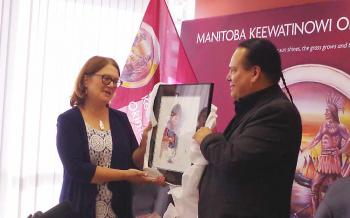Image Caption
Summary
By Marjorie D.L. Roden
Windspeaker.com Contributor
WINNIPEG
An announcement on Sept. 6 in regards to First Nations-led health care transformation revealed a three-year plan that will see nearly $68 million invested in Manitoba, Saskatchewan, and Ontario First Nations.
Indigenous Services Minister Jane Philpott made the announcement and was joined by recently-elected Grand Chief Garrison Settee of Manitoba Keewatinowi Okimakanak (MKO), representing signatories to Treaties 4, 5, 6 and 10.
“It’s all about First Nations beginning to assert control and self determination and self government,” said Settee. “We can bring these services to the north. I am just excited to be a part of this announcement today because it will serve our north and bring services to the north that have been neglected for so long… I welcome this announcement so that we can move forward providing the quality health care needed.”
Philpott noted that it was in March that she met with former MKO grand chief Sheila North and signed a memorandum of understanding on heath transformation.
“Only a few months later we are back with the resources to support the work that the chiefs of the north have determined is necessary to go forward,” said the minister. Manitoba will receive $42 million, Saskatchewan—$13.6 million, and Ontario—$11.9 million. These funds are in addition to monies being provided currently to address shortcomings in services, said the minister.
“This funding is a response to what we have heard from chiefs in communities.” That health care solutions can be found in the North.
“In these communities, the chiefs and councils, the community leaders, the health care providers that work in communities know what needs to happen to enhance health service delivery that is tailored and specific for the communities that are seeking support.”
The idea, said the minister, is to increase the control and the design of health systems and put them in the hands of First Nation governments and mandated Indigenous health authorities and entities.
“The status quo is unacceptable,” Philpott said.
“It is not a secret that the health outcomes for First Nations are vastly different in many cases from non-Indigenous Canadians… One of the calls to action of the Truth and Reconciliation Commission speaks to this, and it calls on all orders of government to acknowledge those gaps, to acknowledge that they are there due to past government policies, and that we need to change those policies…
“The solutions are within your communities. We know that, and I’m struck by the vision and determination of your chiefs, of your leaders in communities, and the strength and resilience of communities who have persevered in spite of very challenging circumstances over the years.”
When asked about how these funds might help others who are off-reserve and in or near urban centres, Philpott said “We know that often people have to be evacuated from communities for issues that could be dealt with if they had a properly resourced health centre or nursing station. They don’t necessarily need to go to a hospital. So some of this funding will help to build stronger health systems throughout these more remote regions. There will always be a need for hospitals, but they are much more expensive facilities to build and maintain, so the idea is that the right care is provided in the right place to meet people’s needs.”
The funding addresses federal government obligations on reserves.
“They are one of the largest areas of need. Often people in cities slip through on the provincial health care system. We know there are gaps in that area, and we know, in particular for children, for example, we have made major investments in the area of Jordan’s Principle, because we know that historically people have fallen through the gaps where there are questions about whose responsibility it is and we have a commitment to make sure that nobody’s care will be denied because of jurisdictional questions.”
Philpott said “There’s lots of work to do everywhere, but as you improve health care in more remote regions, it helps to offload the pressures in the cities.”

